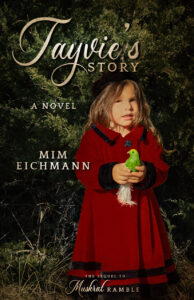Launch: Mim Eichmann’s Tayvie’s Story
INTERVIEW BY MALLY BECKER
A graduate from the Jordan College of Music at Butler University in Indianapolis, Indiana, Chicago-area author Mim Eichmann has found that her creative journey has taken her down many exciting, interwoven pathways as a published lyricist /songwriter, musician, choreographer, journalist and historical fiction author. Her debut historical novel A Sparrow Alone was a semi-finalist in the 2020 Illinois Library Association’s Soon-to-be-Famous Project Competition. The highly anticipated sequel, Muskrat Ramble, was published in March 2021 and the third and final of the bestselling series, Tayvie’s Story, has just been published.
How would you describe your story and its themes in a couple of sentences?
Evocative of the stark coming-of-age biographies of mixed race, early jazz singers, such as Billie Holiday, Ella Fitzgerald and countless other hopefuls of the era, Tayvie’s Story is an extraordinary coming-of-age journey of a talented, young, biracial jazz singer, who, despite appalling circumstances, struggles to perfect her craft on two continents during the volatile 1930s and 1940s.
 What drew you to write Tayvie’s Story?
What drew you to write Tayvie’s Story?
Although a standalone work, the book chronologically parallels that of my novel Muskrat Ramble, in which my protagonist’s four-year-old granddaughter (Tayvie) wanders off in Chicago in December 1923 and immediately becomes lost. Although we do learn where she’s spent her life by the end of Muskrat Ramble, I always knew I wanted to fully explore her story as the third and final novel of this series.
Your story includes real historical characters. How did you bring them to life?
The personalities of all my historic individuals are kept in perspective through extensive research of biographies, reference tomes, documentaries, propaganda film clips as well as full-length films made during the era. Typically, I attempt to bring these characters to life in dialogue with other characters, although their actions often speak even louder. I do have a few disclaimers where my historic characters deviated from reality, however. Joseph Goebbels was not fluent in English, although Magda spoke three or four languages fluently; I have no idea if Magda Goebbels liked jazz music; the lyricist who penned the alternative lyrics used in the Charlie & His Orchestra’s recordings is unknown; and, there were no known thefts of the radium-laced drink Radithor.
Who is your favorite minor/secondary character and why?
Even though she scarcely appears in person, Helga Goebbels is my favorite secondary character. If you watch the short propaganda films of Magda Goebbels and her six children, you can’t help but fall in love with oldest daughter Helga, who, in my opinion, resembled Margaret O’Brien and had a beautiful singing voice. Photos of these stunning children, who were brutally murdered by Magda herself, were taken by Russian soldiers when they broke into Hitler’s Führerbunker. The Goebbels children, innocently dressed in white, are seen lying on bunkbeds, asleep for eternity. No sympathy was ever extended towards them, since they were Nazi butcher Goebbels’ offspring.
Your novel incorporates the true story of how Nazi Reich Minister of Propaganda Joseph Goebbels had American hit songs rewritten and broadcast by ‘Charlie and His Orchestra’ for disinformation purposes. Tell us more.
Well, obviously it was a failed attempt by the Nazis for the most part! Both Churchill and FDR (and many others) found these lyrics more ludicrous than threatening. In one reference book, Hitler’s Airwaves, a CD of many of these original broadcasts was included featuring Lutz Templin’s orchestra and singer Karl Schwedler. It’s important to note that these musicians were extremely well paid for several years by the Nazis for their efforts, a fact that could easily have put them on trial after the war as Nazi sympathizers. Hence, all of those involved kept their identity under wraps for decades.
How has your professional background influenced your writing?
Along Tayvie’s journey, I revealed some of the confusing jargon any fledgling singer might encounter when first thrown into the deep end of the pool. Here’s a brief example when Tayvie’s tasked at the last minute to perform a tune she scarcely knows with a professional jazz ensemble in Harlem:
Impatiently waiving off my reply, Mr. Johnson growled, ‘okay, four bars for nothing, guys,’ over the din of the crowded room. To me he added, ‘just pick it up where you can and come in. We’ll vamp ‘til then. Sing into the top half of that ribbon microphone, by the way. Bottom half’s fussy these days … and shorten the stand.’
I’d seen pictures of microphones in radio ads but had never used one. I located a protruding knot about halfway down the pole that when twisted carefully and then retightened, lowered the microphone’s height.
‘Ok, we take this real up tempo … fast swing, ya got it?
I nodded.
‘Keep it tight, boys. Jabbo, you take the first ride and Bechet, you split the next one with Jimmy, ok?’
‘Just straight ahead from there?’
‘Yeah, yeah, that’s fine,’ snorted Mr. Johnson as he slammed music into several piles on top of the piano. ‘We’ll take this in the original key, also. Miss French Poodle Tippy Toes always wants it down at least a third. No need to transpose, boys.’
Ironically, in a reversal of Jim Crow, darker-skinned female jazz singers from the early 20th century were allowed more musical freedom than their white sisters, who were typically referred to as ‘canaries’ or ‘chirpers.’ However, neither race was remotely embraced by their typically all-male bandmates or paid anything resembling their fellow musicians’ salaries. That prejudice against girl singers still exists in certain jazz bands today even though many feature excellent female musicians. Quite honestly, I’m not known as a jazz singer at all. As a founding member in 2005 of my Chicago-area folk band Trillium, in which I play hammered dulcimer and sing, it’s taken me almost two decades to coerce a few excellent jazz musicians to record some of my favorite early jazz vocals. Those recordings resulted in my recently released ‘I Found a New Baby’ and ‘Sweet Georgia Brown’ CDs. Somewhat nostalgically, I sang a few of those tunes as a youngster, accompanied by my dad on piano.
 What is the best writing advice you have to share?
What is the best writing advice you have to share?
Look for niches in history that haven’t already been written to death by others and fully research those niches. This can be really tricky with popular topics, such as World War II or the Tudors.
What is the last great book you read?
Magda Goebbels: The First Lady of the Third Reich by Hans-Otto Meissner.






